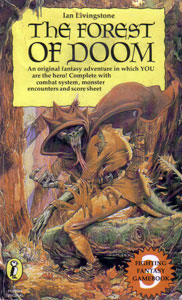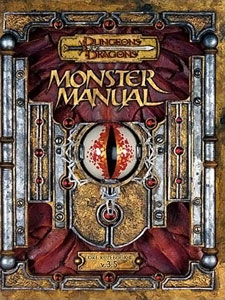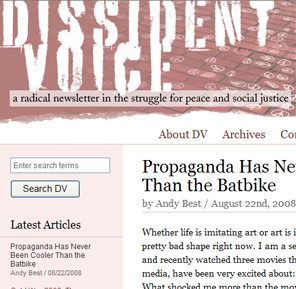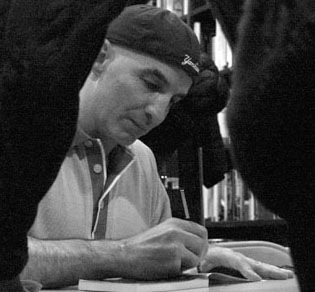This post is continuing from Jim's post that carries on from a comment I made in a discussion of the movie Clash Of The Titans. I want to start on my entry into the world of table-top gaming and fantasy literature through the game-book Forest Of Doom. Then I want to touch on the split in fantasy literature between the traditions of Orientalism in the English language novel and the New Wave authors. Finally, I want to rant on the merits of Dungeons and Dragons in education and how it has open-source ideals (bear with me) - a fact recognised in the industry and solidified in it's D20 movement.
... time passes as reader catches up with huge amount of background ...
 It may be a bad analogy but one day in the final year of elementary school, a butterfly flapped it's wings in the life of Andy Best. Puffin Books had a 'book club' scheme. Twice a year a small catalogue of books, glossy and colourful, was passed around the class. We took it home, chose one, and returned the next week with our order forms. A few weeks later you picked up the book at school.
It may be a bad analogy but one day in the final year of elementary school, a butterfly flapped it's wings in the life of Andy Best. Puffin Books had a 'book club' scheme. Twice a year a small catalogue of books, glossy and colourful, was passed around the class. We took it home, chose one, and returned the next week with our order forms. A few weeks later you picked up the book at school.
I had chosen 'The Forest of Doom'. It was a 'fighting fantasy game book'. Not in the tradition of the Choose Your Own Adventure, the series was created by Steve Jackson and Ian Livingstone who were dedicated to spreading the table-top gaming hobby to the UK. This industry was based around the flagship game, Dungeons and Dragons which itself came from the fantasy literature tradition and borrowed heavily from the achievements of two major authors. Tolkien is obvious, but also H.P. Lovecraft, who wove esoteric lore into a complete fictional universe with demons and planes of existence.
As you can see already, from picking up that first book I was immediately led into reading a diverse literary canon and to playing the games each week. Importantly, this meant creating our own material and playing through it with our peers. I did this devoutly without the need of any further prompting or encouragement, ever. The seemingly living world of the book, the tower of Yaztromo on the edge of the forest, the thief stuck in the bear-trap, the talking crow on the signpost, catapulted me into the idea of other worlds that lived in an abstract dream space where you could play out scenarios and expand your experience without limits. Much like we try to achieve in educational drama.
Then I read Michael Moorcock.
Up until the age of sixteen I had absorbed a huge amount of fantasy and sci-fi literature and started to form more critical opinions but I hadn't been able to put my finger on something that bothered me. This was down to lack of awareness of the history of the world and current affairs. And that analysis of literature beyond identifying characters and narrative structure was not encouraged at school. But what I did know at this point was that, unlike most of my friends, Tolkien bothered me, along with 'hard' sci-fi, and Michael Moorcock was the man.
 What I was unaware of at that time was the split between traditionalists who were still bound by the ideologies of English literary tradition and the New Wave authors like Moorcock and J. G. Ballard. One one hand you had Tolkien, who set out to create a fantasy world that would put across his Empire era worldview to the next generation in a non-didactic manner. One the other hand you had Ballard and Moorcock, and all the authors centred around New Worlds Magazine, who saw fantasy sci-fi as an absract art form with which they could explore the world around them and ask questions of it.
What I was unaware of at that time was the split between traditionalists who were still bound by the ideologies of English literary tradition and the New Wave authors like Moorcock and J. G. Ballard. One one hand you had Tolkien, who set out to create a fantasy world that would put across his Empire era worldview to the next generation in a non-didactic manner. One the other hand you had Ballard and Moorcock, and all the authors centred around New Worlds Magazine, who saw fantasy sci-fi as an absract art form with which they could explore the world around them and ask questions of it.
From Jim's description and anaysis of the Monster Manual you can see the influence of the old-school, both in its contents and in its attitude to the other. But, the key to the game was always that the players could create their own adventures and worlds. More in the tradition of the New Wave. The rules heavily catered to this giving countless generation tables and help to get you started. Eventually, the industry, whether concious of the depth of meaning behind it or not, came to realise that the game would die with its era unless they focused on this key aspect. They identified the D20 system ... basic game mechanics that underpinned all their systems. New versions were adjusted to follow this and you now had a game split into an engine and its mods.
Here is where it gets interesting. Firstly, I have never stopped playing some form of table-top game. I simply can't. Once I got off into teaching I realised early on that the game - R.P.G.s of the table-top variety - was an amazing participatory tool. The players create thier own worlds. Each time you play, the story expands based on the input of the group, each session naturally leads to the next. As you write and expand your gaming universe, you have to actively research it, and the act of playing through it kills dead ends and reinforces strong lines. From D20 you could go into any setting - or any course, so to speak.
This worked immediately for me on many levels due to my background training in Drama and Education. As with drama, the D20 game provides you with many tools for participation that can be utilised in part as well as in whole. The most recent use of these tools was to play through a story/event based D&D game with some of my advanced language students and later introduce the idea of devising and improvisation in story writing. During the game play, the students had learned skills of testing work through use, rejecting weak points and running with parts that were working. This was a welcome change, they are turing 13 at the moment, from their school model of being told to write a story in isolation, then having it marked, or worse still reading it out and having it appraised (euphemism of the week).
Obviously, D20 products are not free and there's a nice big semantic debate out there as to whether it's open source in the way a wiki is. However, the game is written to be modified and customized by the players and offers huge scope. It is a platform for open participation that contains many tools. And opening that first book turned me onto art and helped me eventually get out of the ideological maze I was been run through at school. And lets not forget, it's a social activity in which people happily come together with their peers and think and create - without any kind of prodding or educational structure or goals.

 I am (an) expendable. What the hell does that mean?
I am (an) expendable. What the hell does that mean? It may be a bad analogy but one day in the final year of elementary school, a butterfly flapped it's wings in the life of Andy Best. Puffin Books had a 'book club' scheme. Twice a year a small catalogue of books, glossy and colourful, was passed around the class. We took it home, chose one, and returned the next week with our order forms. A few weeks later you picked up the book at school.
It may be a bad analogy but one day in the final year of elementary school, a butterfly flapped it's wings in the life of Andy Best. Puffin Books had a 'book club' scheme. Twice a year a small catalogue of books, glossy and colourful, was passed around the class. We took it home, chose one, and returned the next week with our order forms. A few weeks later you picked up the book at school.  What I was unaware of at that time was the split between traditionalists who were still bound by the ideologies of English literary tradition and the New Wave authors like Moorcock and J. G. Ballard. One one hand you had Tolkien, who set out to create a fantasy world that would put across his Empire era worldview to the next generation in a non-didactic manner. One the other hand you had Ballard and Moorcock, and all the authors centred around
What I was unaware of at that time was the split between traditionalists who were still bound by the ideologies of English literary tradition and the New Wave authors like Moorcock and J. G. Ballard. One one hand you had Tolkien, who set out to create a fantasy world that would put across his Empire era worldview to the next generation in a non-didactic manner. One the other hand you had Ballard and Moorcock, and all the authors centred around